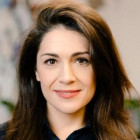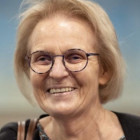Panel Discussion
Rising to the Challenges of Learning During Conflict and Crisis
Date Friday, Nov 29 Time – Room: Koepenick II / III
War and conflict tear apart education systems, blow up educational institutions, deprive displaced youth of years of learning, are a major source of physical and emotional trauma with little of hope of ever re-joining education pathways. Quality digital learning addresses the most urgent needs after health, nutrition and shelter - that of a structured and caring learning environment where displaced youth can acquire and strengthen crucial life skills. Join this session to hear from the most dedicated digital pedagogues about their Education in Emergencies and Higher Education in Emergencies programmes.

Manuela Verduci
Managing Director, Kiron Digital Learning Solutions, Germany
Manuela Verduci is the Managing Director at Kiron Digital Learning Solutions, where she passionately drives the mission to expand educational access to underserved communities worldwide. She is also the co-founder and the current leader of the Match Talent Initiative, which aims to innovate inclusion efforts both in Germany and internationally.
Currently pursuing a PhD at the Free University of Berlin, Manuela holds a Master’s degree in Philosophy from the University of Florence. She is a published author with multiple publications about philosophy, migration, and diversity.
Beyond her professional commitments, Manuela dedicates her time to educating tech entrepreneurs on philosophy of technology, fostering a deeper understanding of ethical implications in the digital age.

Ihor Katernyak
Associate Professor, Ivan Franko National University of Lviv (Ukraine)
Ihor Katernyak is affiliated with Ivan Franko National University of Lviv in Ukraine. He holds a PhD in Physics and Mathematics and serves as an Associate Professor in the Electronics & Computer Technology Department. His research interests encompass e-learning, knowledge management, digital transformation in education, entrepreneurship, tech startups, technology transfer, and open innovation. He has been published in reputable journals such as Higher Education, Skills and Work-based Learning, Universal Journal of Education Research, and Interactive Technology and Smart Education, among others.
Furthermore, he initiated a series of events including the "Idea Marathon" (held annually from March to May), "Innovation Spring" as a brokerage event (held annually in April), and "Startup Jam" (held from November to December). These events are designed to inspire young researchers and students to explore their ideas in the contexts of value innovation and tech startups. In addition, he is an expert in Innovation policy and ICT4Dev.
Ihor Katernyak is also the founder and CEO of the Ukrainian Distance Learning (UDL) System NGO.

David Hollow
Leader of Jigsaw Education and Research Director of EdTech Hub, EdTech Hub, UK
David leads Jigsaw Education, an independent education research organisation focused on low-income countries with specialisms in EdTech, climate education and refugee education. He is also the Research Director at EdTech Hub, a global movement working for an evidence-driven future in EdTech. He has worked in over 25 countries, helping governments, donors and NGOs to use evidence to bring about lasting change in education. David holds a PhD from the University of London (2010) and serves on various boards, including for Refugee Education UK.
Links

Barbara Moser-Mercer
Visiting Fellow Oxford Refugee Studies Center, University of Nairobi, Kenya
Barbara Moser-Mercer, professor emerita and founder of InZone (University of Geneva), is visiting professor at University of Nairobi, engaged in strengthening African solutions that advance Higher Education in Emergencies (HEiE) and has designed and been coordinating the African Higher Education in Emergencies Network (AHEEN) operating in Kenya, Somalia, South Sudan, Burundi and South Africa to ensure that forcibly displaced youth access and complete higher education. She has also been a Visiting Fellow at the University of Oxford’s Refugee Studies Center to advance her research into Higher Education in Emergencies. Following her initial training as conference interpreter she pursued her studies and research in cognitive psychology, focusing on the development of expertise in complex cognitive skills. She has applied these findings to learning in protracted humanitarian emergencies.